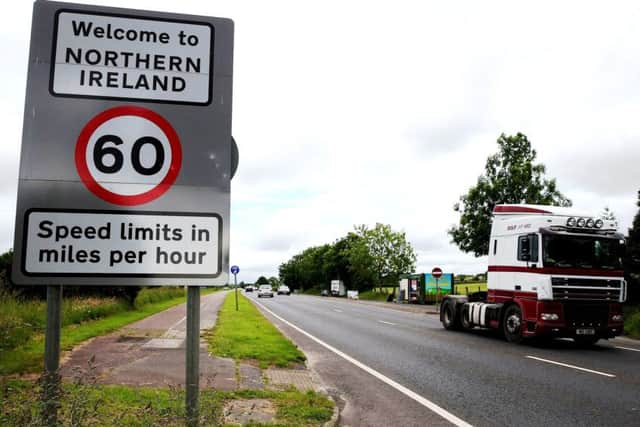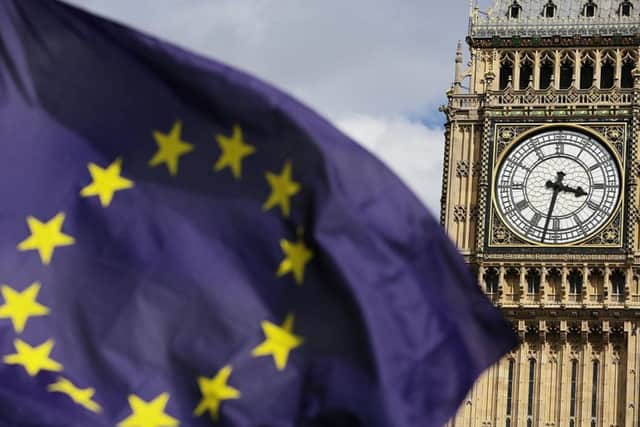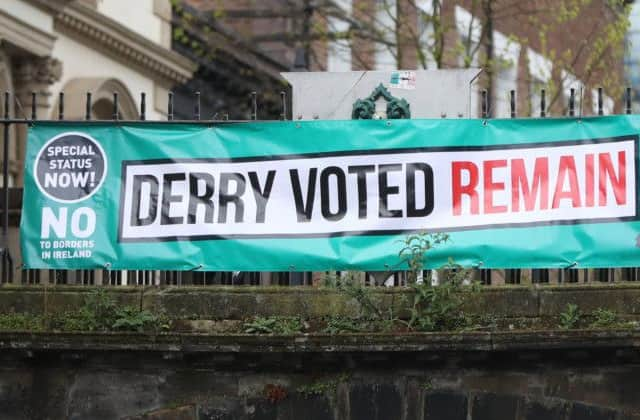Probe into Brexit impact on cross-border services


The Western Trust has told the ‘Journal’ that it is evaluating the potential impact of the UK leaving the EU on services here, while officials from the Department of Health (DoH) in the north have said they are monitoring developments.
Over recent years, more and more patients from across Derry, Donegal, Limavady and Tyrone have been able to access health services on either side of the Irish border as a result of closer working ties and partnership agreements between health bodies and governments north and south.
Advertisement
Hide AdAdvertisement
Hide AdThis has included the hard won £65m North West Cancer Centre at Altnagelvin Hospital, which opened in November 2016 and which treats cancer patients from the north and Donegal.


Other cross-border services include the cardiology service at Altnagelvin, Dublin-based treatment for children with heart conditions, an EU-funded project to enable older people with long term conditions to live independently and a regional Mental Health Recovery College.
On a hopeful note, a DoH spokesperson has confirmed that some of the key services locally, including the Cancer Centre, were not underpinned by European regulations.
In line with this, one of the most senior civil servants in Britain and the Comptroller and Auditor General in the north, have both suggested the treatment of Donegal cancer patients in Derry and of Derry children with serious heart conditions in Dublin, need not be affected by Brexit.
Advertisement
Hide AdAdvertisement
Hide AdChris Wormald who, as Permanent Secretary of the DoH in England and Wales, manages a budget of almost £150 billion, has said he believes there is nothing to stop cross-border arrangements continuing under bilateral agreements between Dublin and Belfast or Dublin and London.


DUP MP Sammy Wilson raised the matter at a recent meeting of the Westminster Committee for Exiting the European Union.
“Currently, there are arrangements for cancer patients to be treated in Londonderry, for children with heart disease to be treated in Dublin and for Accident and Emergency to be provided in Newry,” Mr. Wilson noted.
Asked if there was any reason why these arrangements couldn’t continue under a bilateral agreement between the UK and the Republic of Ireland, Mr. Wormald said: “There is nothing to stop it.”
Advertisement
Hide AdAdvertisement
Hide AdKieran Donnelly, the Auditor General, has taken a similar view in his new Northern Ireland Audit Office (NIAO) report ‘The UK Border: how prepared is Northern Ireland for exiting the EU?’ In it he states: “North-South collaboration in healthcare has evolved in response to patient need, both in border areas and on an all-island basis. Many services are not underpinned by European Regulations, for example, the All-Island Congenital Heart Disease Network and the North West Cancer Centre at Altnagelvin are based on inter-governmental agreements between the respective health departments north and south, underpinned by Service Level Agreements.


“Some cross-border services are funded through EU programmes. Northern Ireland, on its own, would not be able to maintain such specialised services.”
A spokesperson for the Western Trust said it is “currently assessing any potential impact that Brexit will have on all cross-border services.”
A DoH spokesperson meanwhile said: “Cross-border services provided at Altnagelvin Hospital, including the North West Cancer Centre and Primary Percutaneous Coronary Intervention (pPCI), are not underpinned by European Regulations, but are based on Service Level Agreements between the Western Health & Social Care Trust and health authorities in the Republic of Ireland. Patients are registered with their own health service, which pays for the cross-jurisdictional aspect of these services.
Advertisement
Hide AdAdvertisement
Hide Ad“DoH will continue to monitor the outcome of the UK Government’s EU Exit negotiations and shall discuss any potential impact on cross border acute services with the DoH (RoI) through our existing joint oversight arrangements.”
The DoH has also confirmed that, more widely, it was planning against all potential outcomes in the Brexit negotiations, including the “worst case scenario” of a ‘no deal.’
“In order to ensure public services continue to operate to an acceptable level on Day 1 following the UK exit from the EU, regardless of the negotiated outcome, all NI Government Departments and their Arm’s Length Bodies (ALBs) are considering the potential impact on the policies and services for which they are responsible, as well as possible actions required and solutions that may need to be put in place,” the spoesperson said, adding:
“The Department of Health (DoH) is planning against a ‘no deal’ scenario. This does not suggest that DoH expects this outcome from the negotiations, but rather that it recognises that it is responsible for ensuring a smooth exit under any eventuality and, as such, is planning for the ‘worst case scenario’.
Advertisement
Hide AdAdvertisement
Hide Ad“There is continued engagement with the Department’s 17 Arm’s Length Bodies (ALBs) and all ALB Chief Executives have provided a statement of assurance to DoH Permanent Secretary Richard Pengelly that scoping work has been carried out on the potential impact of a ‘no deal’ EU Exit on service provision and that any additional issues not already captured in the Department’s priorities, have been highlighted.”